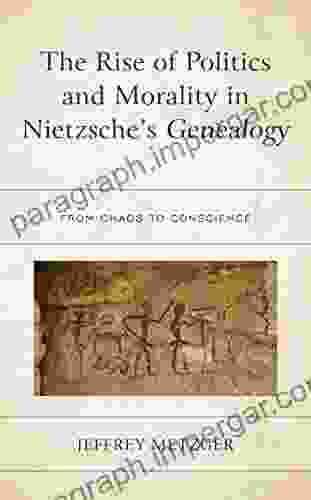The Rise of Politics and Morality in Nietzsche's Genealogy

Friedrich Nietzsche's work has been highly influential in the development of modern political and moral thought. His critique of traditional morality and his emphasis on the importance of individual autonomy and self-creation have had a profound impact on our understanding of the human condition. In this article, we will explore the development of political and moral ideas in Nietzsche's work, with a particular focus on his **genealogy of morality**.
5 out of 5
| Language | : | English |
| File size | : | 3592 KB |
| Text-to-Speech | : | Enabled |
| Screen Reader | : | Supported |
| Enhanced typesetting | : | Enabled |
| Word Wise | : | Enabled |
| Print length | : | 195 pages |
The Genealogy of Morality
Nietzsche's genealogy of morality is a historical and critical account of the origins and development of moral ideas. In his book **On the Genealogy of Morality**, Nietzsche argues that morality is not a natural or universal phenomenon, but rather a product of specific historical and social conditions. He traces the development of morality from its origins in pre-Socratic Greek thought to its culmination in Christian ethics.
According to Nietzsche, the earliest form of morality was based on the **master-slave dialectic**. The masters were the strong and powerful, while the slaves were the weak and powerless. The masters created morality as a way to justify their domination over the slaves. They defined good as that which was beneficial to the masters, and evil as that which was harmful to the masters.
Over time, the master-slave dialectic was inverted. The slaves became the majority, and they began to resent the morality of the masters. They created their own morality, which was based on the values of compassion, humility, and self-sacrifice. This new morality was eventually adopted by the masters, and it became the dominant morality in Western culture.
The Role of Politics in the Development of Morality
Nietzsche argues that politics plays a central role in the development of morality. He sees politics as a struggle for power between different groups and individuals. Morality is one of the tools that is used in this struggle. Dominant groups use morality to justify their domination, while subordinate groups use morality to resist domination.
The master-slave dialectic is a good example of how politics can shape morality. The masters created morality as a way to justify their domination over the slaves. The slaves then inverted the master-slave dialectic and created their own morality. This new morality was eventually adopted by the masters, and it became the dominant morality in Western culture.
The Implications of Nietzsche's Work for Contemporary Political and Moral Thought
Nietzsche's work has had a profound impact on contemporary political and moral thought. His critique of traditional morality has led to a widespread questioning of the foundations of our moral beliefs. His emphasis on the importance of individual autonomy and self-creation has inspired new ways of thinking about human freedom and responsibility.
Nietzsche's work is not without its critics. Some argue that his critique of morality is too radical and that it undermines the possibility of any meaningful moral discourse. Others argue that his emphasis on individual autonomy and self-creation is elitist and that it ignores the importance of social solidarity and cooperation.
Despite these criticisms, Nietzsche's work remains a major source of inspiration for contemporary political and moral thought. His insights into the origins and development of morality have helped us to understand the complex relationship between power, politics, and morality. His work continues to challenge our assumptions about the human condition and to inspire new ways of thinking about the possibilities of human freedom and responsibility.
5 out of 5
| Language | : | English |
| File size | : | 3592 KB |
| Text-to-Speech | : | Enabled |
| Screen Reader | : | Supported |
| Enhanced typesetting | : | Enabled |
| Word Wise | : | Enabled |
| Print length | : | 195 pages |
Do you want to contribute by writing guest posts on this blog?
Please contact us and send us a resume of previous articles that you have written.
 Book
Book Novel
Novel Page
Page Chapter
Chapter Text
Text Story
Story Genre
Genre Reader
Reader Library
Library Paperback
Paperback E-book
E-book Magazine
Magazine Newspaper
Newspaper Paragraph
Paragraph Sentence
Sentence Bookmark
Bookmark Shelf
Shelf Glossary
Glossary Bibliography
Bibliography Foreword
Foreword Preface
Preface Synopsis
Synopsis Annotation
Annotation Footnote
Footnote Manuscript
Manuscript Scroll
Scroll Codex
Codex Tome
Tome Bestseller
Bestseller Classics
Classics Library card
Library card Narrative
Narrative Biography
Biography Autobiography
Autobiography Memoir
Memoir Reference
Reference Encyclopedia
Encyclopedia Jodi Magness
Jodi Magness John A Mccormick
John A Mccormick Joanna Gosser
Joanna Gosser Johann Christoph Arnold
Johann Christoph Arnold Jeffrey M Schwartz
Jeffrey M Schwartz Jeff Meckstroth
Jeff Meckstroth Jim Bernhard
Jim Bernhard John B Nichols
John B Nichols Jeremy R Kinney
Jeremy R Kinney Joe Nobody
Joe Nobody Joe Biel
Joe Biel Jochen Rau
Jochen Rau Jennifer Croft
Jennifer Croft Jenn Bishop
Jenn Bishop Jennifer George
Jennifer George John C Halpin
John C Halpin Jessica Redland
Jessica Redland Jeff Tweedy
Jeff Tweedy Jing Zhang
Jing Zhang Joel Levey
Joel Levey
Light bulbAdvertise smarter! Our strategic ad space ensures maximum exposure. Reserve your spot today!

 Devon MitchellBuilding The Perfect Tool Chest: A Step-by-Step Guide to Crafting a Custom...
Devon MitchellBuilding The Perfect Tool Chest: A Step-by-Step Guide to Crafting a Custom...
 Edgar CoxThe Cancer Patient's Guide to Overcoming Depression and Anxiety: Reclaim Your...
Edgar CoxThe Cancer Patient's Guide to Overcoming Depression and Anxiety: Reclaim Your...
 Duane KellyHeavy Metal and Metalloid Contamination of Surface and Underground Water: A...
Duane KellyHeavy Metal and Metalloid Contamination of Surface and Underground Water: A... Mark TwainFollow ·8.8k
Mark TwainFollow ·8.8k Benji PowellFollow ·19.4k
Benji PowellFollow ·19.4k John GreenFollow ·10.9k
John GreenFollow ·10.9k Darren NelsonFollow ·3.3k
Darren NelsonFollow ·3.3k David BaldacciFollow ·2k
David BaldacciFollow ·2k William ShakespeareFollow ·7.8k
William ShakespeareFollow ·7.8k Kenzaburō ŌeFollow ·18.1k
Kenzaburō ŌeFollow ·18.1k Clarence BrooksFollow ·14k
Clarence BrooksFollow ·14k

 Christian Barnes
Christian BarnesUnleash Your Creativity: Build Interlocking 3D Animal and...
Discover the Art of Paper...

 Terry Bell
Terry BellUnveiling the Secrets of Winning: A Comprehensive Guide...
In the realm of chance and fortune, the...

 Albert Camus
Albert Camus101 Things That You Should Do Before Leaving The House In...
Starting your day right is...

 Anthony Burgess
Anthony BurgessForcing Move 2024 Volume: Unleash Your Inner Grandmaster
Embark on an extraordinary chess...
5 out of 5
| Language | : | English |
| File size | : | 3592 KB |
| Text-to-Speech | : | Enabled |
| Screen Reader | : | Supported |
| Enhanced typesetting | : | Enabled |
| Word Wise | : | Enabled |
| Print length | : | 195 pages |










